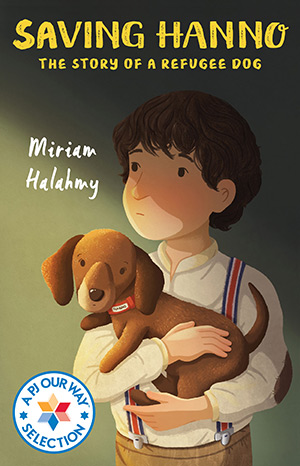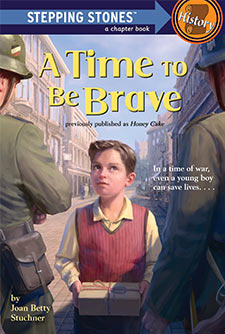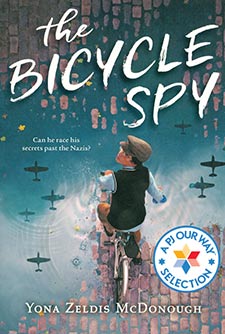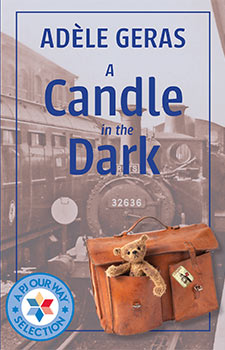Saving Hanno
German-Jewish refugee Rudi can’t wait for his dog, Hanno, to join him in his foster home in England. But with food scarce and the country preparing for war, the animals’ lives are in danger! Can Rudi find a way to save Hanno?
Average Rating
( hint: Login to leave a review! )
141 Reviews
Leave Review
What the Book Is About
Jewish Content & Values
Positive Role Models
Content Advisory
Talk It Over
More for You
What the Book Is About
Nine-year-old Rudi and his older sister Lotte are lucky to get a place on a Kindertransport. Their parents even manage to find a German man who is willing to smuggle Rudi’s precious dachshund, Hanno, to London. Rudi is taken in by kindly, childless Auntie Irene and Uncle Don, but Lotte is forced to work at menial jobs rather than continuing her education, threatening her hopes of becoming a doctor. Just when Rudi is learning a little English and starting to fit in, he finds out that, with war looming, people are euthanizing their pets to save them from suffering later, and he joins forces with a group of brave children who are determined to save the animals. An author’s note explains that Saving Hanno is based in part on a true story.
Jewish Content & Values
- Before Rudi and Lotte leave on the Kindertransport, there are scenes in school in Germany when the Jewish children are sent to sit at the back of the room, and the bully hits a Jewish child on the playground.
- Scenes of home life in Germany include Rudi helping his mother make challah for Shabbat, Mutti lighting the Shabbat candles, and wine being sipped and challah eaten after the prayers (brachot) are said. In England, Lotte reminisces about lighting the candles and making kiddush with their parents, and she and Rudi try to remember the bracha over the wine.
- Rudi’s family does not keep strictly kosher, but Rudi is careful not to eat pork in England, and the non-Jewish people he meets are sensitive to that.
- An afterword talks about Kristallnacht and the Kindertransports.
Positive Role Models
- Living in an area without other Jewish children around, Rudi still holds fast to his Jewish heritage. He does not eat pork, even though pork sausages are a staple of the British diet, and he reminds himself to keep practicing his Hebrew prayers so that he does not forget them.
- Auntie Irene and Uncle Don, a non-Jewish couple, take in Rudi and Hanno and are understanding of and patient with Rudi.
- Tilly devises a plan to rescue the animals by sheltering them in a hut in the woods, and when the children are evacuated and won’t be able to look after the animals, she bravely perseveres and comes up with an alternate plan.
Content Advisory
At the start of the book, Rudi experiences and witnesses some antisemitism at school, including bullying and being made to sit at the back of the class. Later, there is some discussion about the pets being put to sleep when the war starts because food will be too scarce. The story ends well, but there is some tension and worry about Hanno’s fate. The afterword explains that 750,000 pets were put to sleep at the start of the war.
Talk It Over
Auntie Irene forbids Rudi from bringing his friend Sidney home. Sidney comes from a poor family and lives in an underprivileged neighborhood, and Auntie Irene thinks Sidney will be a bad influence on Rudi. But Rudi continues to see his friend; he simply goes to Sidney’s house so that Auntie Irene doesn’t know. What would you do in Rudi’s situation, and why?
More for You
As Rudi and Sidney are cycling home one night, a friend advises them of what to watch out for along the way. This is because during World War II, Britain had a blackout every night, during which streetlights were switched off, vehicle headlights were covered, and white lines were painted around trees for visibility. In the event of an air raid, people went to public shelters. Israel has its own system in place to protect civilians in the event of an attack. Sirens warn the population, with the duration of the siren indicating the amount of time people have to get to a designated secure space. Secure spaces include concrete-built public shelters and reinforced rooms in private homes. Aside from sirens, messages are disseminated via the internet, TV, radio, and a mobile app. There is a special silent radio station for those who do not use electricity on Shabbat.
What the Book Is About
What the Book Is About
Nine-year-old Rudi and his older sister Lotte are lucky to get a place on a Kindertransport. Their parents even manage to find a German man who is willing to smuggle Rudi’s precious dachshund, Hanno, to London. Rudi is taken in by kindly, childless Auntie Irene and Uncle Don, but Lotte is forced to work at menial jobs rather than continuing her education, threatening her hopes of becoming a doctor. Just when Rudi is learning a little English and starting to fit in, he finds out that, with war looming, people are euthanizing their pets to save them from suffering later, and he joins forces with a group of brave children who are determined to save the animals. An author’s note explains that Saving Hanno is based in part on a true story.
Jewish Content & Values
Jewish Content & Values
- Before Rudi and Lotte leave on the Kindertransport, there are scenes in school in Germany when the Jewish children are sent to sit at the back of the room, and the bully hits a Jewish child on the playground.
- Scenes of home life in Germany include Rudi helping his mother make challah for Shabbat, Mutti lighting the Shabbat candles, and wine being sipped and challah eaten after the prayers (brachot) are said. In England, Lotte reminisces about lighting the candles and making kiddush with their parents, and she and Rudi try to remember the bracha over the wine.
- Rudi’s family does not keep strictly kosher, but Rudi is careful not to eat pork in England, and the non-Jewish people he meets are sensitive to that.
- An afterword talks about Kristallnacht and the Kindertransports.
Positive Role Models
Positive Role Models
- Living in an area without other Jewish children around, Rudi still holds fast to his Jewish heritage. He does not eat pork, even though pork sausages are a staple of the British diet, and he reminds himself to keep practicing his Hebrew prayers so that he does not forget them.
- Auntie Irene and Uncle Don, a non-Jewish couple, take in Rudi and Hanno and are understanding of and patient with Rudi.
- Tilly devises a plan to rescue the animals by sheltering them in a hut in the woods, and when the children are evacuated and won’t be able to look after the animals, she bravely perseveres and comes up with an alternate plan.
Content Advisory
Content Advisory
At the start of the book, Rudi experiences and witnesses some antisemitism at school, including bullying and being made to sit at the back of the class. Later, there is some discussion about the pets being put to sleep when the war starts because food will be too scarce. The story ends well, but there is some tension and worry about Hanno’s fate. The afterword explains that 750,000 pets were put to sleep at the start of the war.
Talk It Over
Talk It Over
Auntie Irene forbids Rudi from bringing his friend Sidney home. Sidney comes from a poor family and lives in an underprivileged neighborhood, and Auntie Irene thinks Sidney will be a bad influence on Rudi. But Rudi continues to see his friend; he simply goes to Sidney’s house so that Auntie Irene doesn’t know. What would you do in Rudi’s situation, and why?
More for You
More for You
As Rudi and Sidney are cycling home one night, a friend advises them of what to watch out for along the way. This is because during World War II, Britain had a blackout every night, during which streetlights were switched off, vehicle headlights were covered, and white lines were painted around trees for visibility. In the event of an air raid, people went to public shelters. Israel has its own system in place to protect civilians in the event of an attack. Sirens warn the population, with the duration of the siren indicating the amount of time people have to get to a designated secure space. Secure spaces include concrete-built public shelters and reinforced rooms in private homes. Aside from sirens, messages are disseminated via the internet, TV, radio, and a mobile app. There is a special silent radio station for those who do not use electricity on Shabbat.




